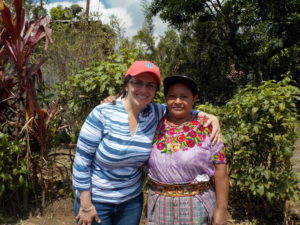In May of 2016, I visited a project that the Borlaug Institute was implementing in Guatemala, focused on training coffee farmers in good agricultural practices to help increase their yield while overcoming leaf rust disease and other challenges. The farmer cooperative we worked with was led by a group of men, mostly in their 30s, who made the decisions regarding every aspect of the business. They purchased all supplies and materials and planted the coffee trees. Other activities were done by a group of women in support of the farm, such as harvesting the coffee cherries and washing and sorting the beans. The day of our visit, I noticed a woman, Ana, who I estimated to be in her 50’s. She made sure that all was taken care of in service of the cooperative, providing us lunch and looking after our every need. One day, there was a very lively discussion at a meeting of the cooperative officers over whether it made sense for them to spend their limited funds in buying fungicide. As the yelling got louder, Ana began to speak, bringing the entire place to a hush. Ana said to them, “so, if you don’t apply the fungicide, the fungus that causes leaf rust disease will wipe away our crops, right?”. She then reminded them that they had just planted a new variety of coffee, “Centroamericano”, bred in a laboratory for its resistance to the disease. She told them that they needed to stop arguing and to save their money to use for another purpose. The men hung their heads low, and were very deferential to her, something that both surprised and delighted me. It was evident that she knew what she was talking about due both to her experiences in the field since childhood, and to her belief in the power of agricultural science. Most importantly, the men recognized this, and immediately told her that she was right and that they would accept her recommendation. She later shared with me that the daily farm chores she performed were out of a sense of duty, that preparing and serving the famers meals was done out of respect, but that teaching them how to grow coffee so they could support their families and communities was done out of a sense of commitment to the future of her country. That day, I saw servant leadership in action, displayed with great wisdom and humility. On this International Women’s Day, it is a pleasure to share such an unforgettable example of the key role that one woman, Ana, is playing to end world hunger in Guatemala. It is a testament of what women can do if given the opportunity. It is a call to action to all of us who work in agriculture development to do all we can to elevate their voices, and their influence in our quest to end world hunger.
-Dr. Elsa Murano on International Women’s Day 2021


